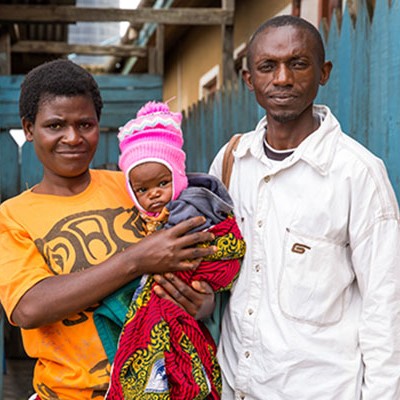Engender Health has worked to engage men for over 20 years. While our vision is “women and girls, first,” our goal of creating programs that are accountable to women and girls demands the engagement of men as partners, as clients of sexual and reproductive health (SRH) services, as positive influences, and ultimately as allies in respecting, protecting, and fulfilling the SRH rights of women and girls.
Where do we start in our work to engage men in a meaningful way?
We start at the root cause of women’s hindered ability to exercise their sexual and reproductive health and rights (SRHR)—gender inequality. Gender inequality impacts women’s (and men’s) SRH options, choices, and decisions. Therefore, understanding concepts of gender and gender norms, and specifically how they influence access to SRH services, is a crucial starting point for engaging men.
Gender refers to the social attributes and opportunities associated with being male or female. Gender can also relate to expectations that exist about what it means to “be a man” and what it means to “be a woman”—what is expected or is deemed normal and appropriate based on being these gender identities. These gender norms influence and shape people’s behavior, attitudes, the actions we take, and the decisions we make – both in general and in relation to our SRH. Because these norms are socially constructed, we can also work to undo the harmful norms that put women and men at increased risk for negative health outcomes, secure women’s SRHR, and create communities and societies that are more equitable. Challenging existing gender norms and inequalities means confronting the attitudes, behaviors, and power structures that uphold them.
In Ethiopia for example, the Unite for a Better Life program, works to engage men to reduce intimate partner violence and HIV and to become agents for change in support of women’s SRHR. In this case, the traditional Ethiopian coffee ceremony was used as a platform for community discussions about gender equity. The ceremony is deeply ingrained in Ethiopian culture and social life and can often take place several times a day within a home or a village. Roasting and grinding the beans and serving the coffee are traditionally seen as the responsibility of women. Using trained peer facilitators, the program challenged this view and encouraged men’s equal participation. By sparking crucial conversations and conducting skills-building sessions within the ceremony, this targeted strategy increased acceptability, ensured cultural sensitivity, and facilitated more equitable roles between men and women. Women were asked to evaluate the program in order to keep organizers accountable to their needs. One of the participant-facilitators remarked: “There are many traditional gender norms that I considered impossible to change; the program has enabled me to change this thinking and has significantly impacted my personal life.”
Developing programs that effectively engage men to advance gender equality, challenge inequities, and promote access to SRHR services, can be difficult. But there are many resources available to make it possible. Engaging Men in Sexual and Reproductive Health and Rights, Including Family Planning: Why Using a Gender Lens Matters – a tool developed in collaboration with UNFPA – outlines six steps for designing programs that take into consideration gender and gender norms when engaging men and building men’s support for SRH and rights. The guide seeks to increase the user’s knowledge of gender, and reflect on gender norms in their own context, and thus how a ‘gender lens’ can be applied to the planning, implementation and evaluation of their intervention to engage men. Operating with a gender lens’ reduces the possibility of, unintentionally, perpetuating harmful norms and stereotypes, and increases the program’s ability to meet the actual needs of both women and men.
Numerous organizations do powerful gender equity work, with quality tools and guides to encourage male engagement. The International Center for Research on Women (ICRW) recently published Gender Equity and Male Engagement: It Only Works if Everyone Plays, which lays out a strong pathway for transforming gender norms by engaging men in interventions. Raising Voices in Uganda developed SASA!, a gender-transformative approach for mobilizing communities to reduce men’s violence against women and to reduce HIV infection. And Promundo and Sonke Gender Justice manage MenCare, a global campaign implemented in 45 counties that challenges traditional gender norms around women’s and men’s caregiving and seeks to promote men’s involvement “as equitable, nonviolent fathers and caregivers in order to achieve family well-being, gender equality, and better health for mothers, fathers, and children.”
By addressing harmful gender norms that hinder men’s and women’s ability to live freely, we improve women’s status, and thus improve the quality of life for all.
For more information about Engender Health’s work, visit www.engenderhealth.org.
